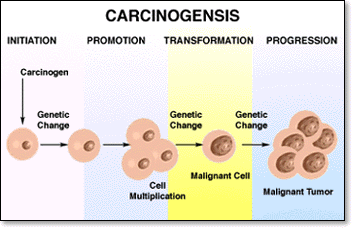
CARCINOGENESIS
Carcinogenesis is a process in which cells a growth advantage over their neighboring cells are transformed by mutations in the genes that control cell division and no longer respond to regulatory signals. Carcinogenesis process is composed of three main stages: initiation, promotion, and progression.
Initiation
The initiation stage of carcinogenesis involves the mutation, alteration, or change in genes that occurs spontaneously or induced by a carcinogenic agent. These genetic alterations can cause the dysfunction of biochemical signaling pathways that control when a cell divides as well as proliferation and survival.
Promotion:
This stage of carcinogenesis a long and reversible processes in which active proliferating preneoplatic cells accumulate. The mutated cells remain harmless until it is stimulated to undergo more proliferation, causing a disturbance within the cells and accumulation.
Progression:
In this final stage of carcinogenesis, genetic and phenotypic changes take place and cell proliferation occurs. In this stage, tumor size increases rapidly leading to cells undergoing further mutations with invasive and metastatic properties. Once the tumors invade the blood steam or invade the lymph system, they become metastatic and migrate throughout the body. Once this occurs, the cancer can spread to other organs causing further damage.
This process of carcinogenesis is initiated by cancer causing agents called carcinogens.
